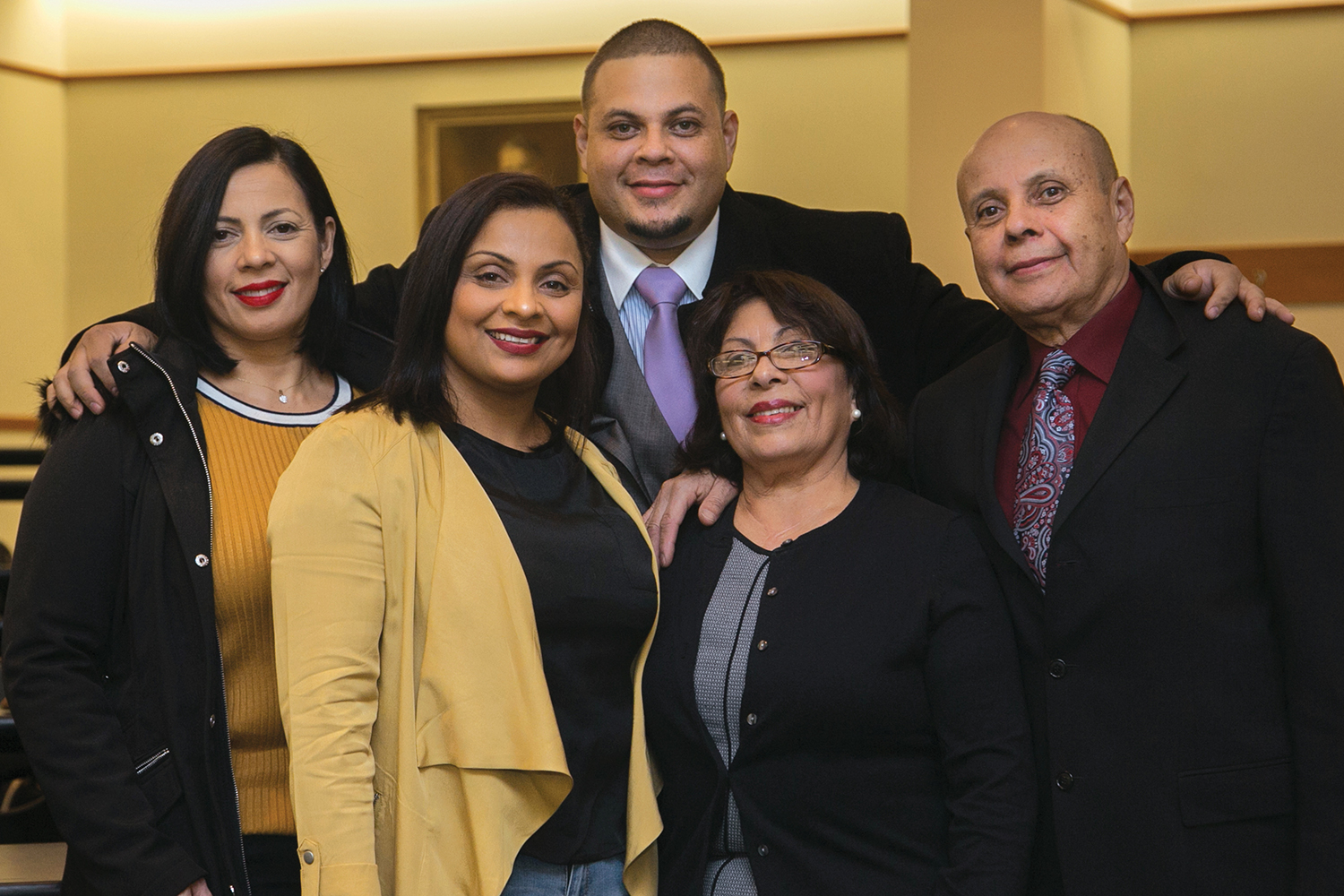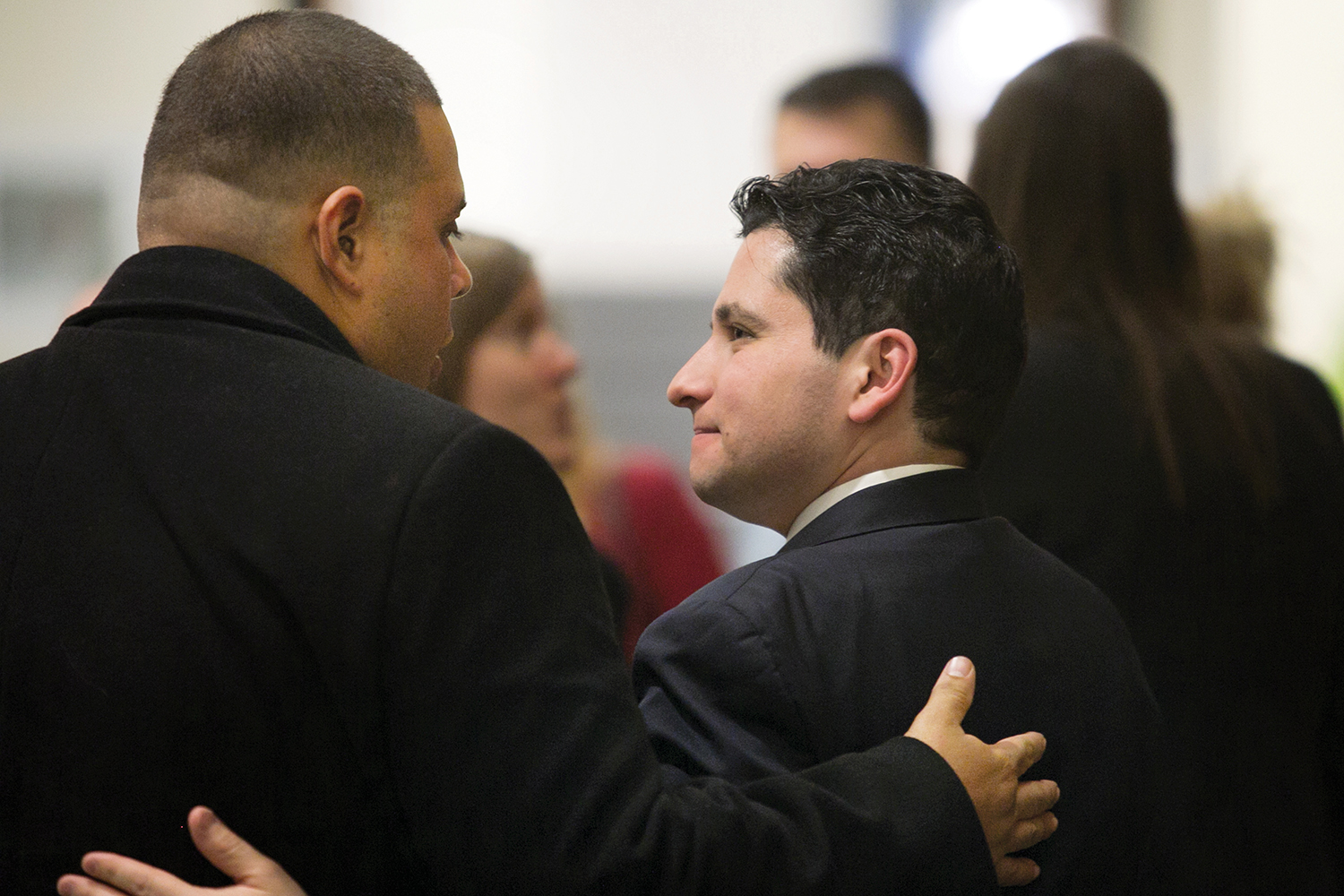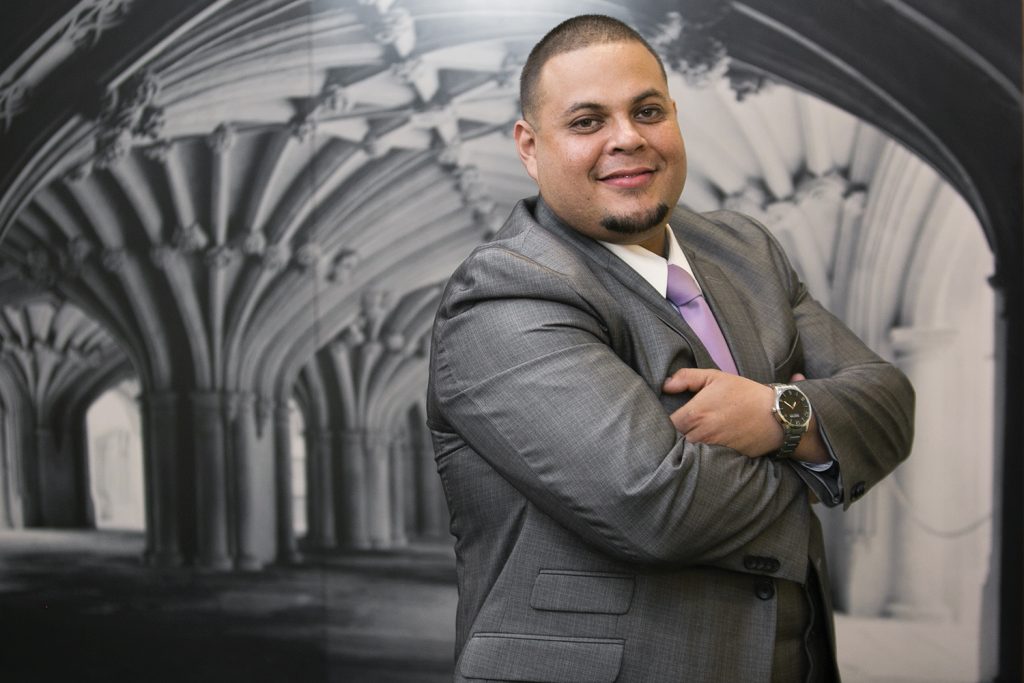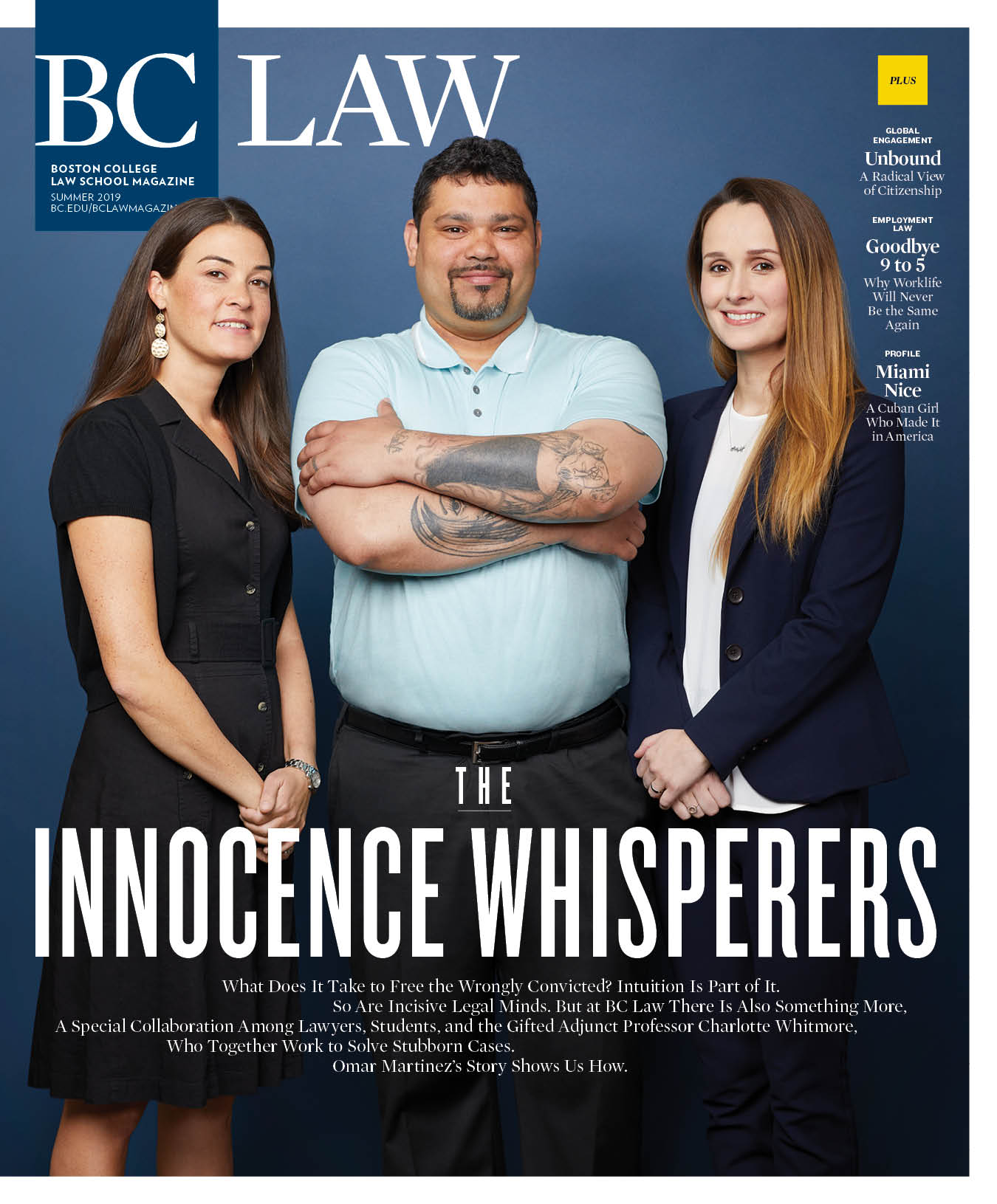Today’s roiling debate over immigration has obscured the human toll paid by those caught up in the US immigration system. For a look at the system’s least attractive face, consider the predicament of Wilmer García, a client of Boston College’s Post Deportation Human Rights Project (PDHRP) and Nixon Peabody.
In 2003, fresh out of high school, García, a legal permanent resident living near New Orleans, pled guilty, on advice of counsel, to simple drug possession after a routine traffic stop turned up one dose of an illegal drug. For two years after his plea, García buckled down, keeping probation appointments, working at a tire store, applying to college. Then one morning uniformed men started banging on his door. “I thought, ‘Whoa, what’s going on?’” he says. “When I opened the door, ICE officers pushed me to the floor, yelling, ‘Get down! Get down!’ like in the movies.”
“It’s OK, I’m legal,” García assured them.
“Let me correct you,” one agent replied. “You were legal.”
It turned out that, in advising him to plead out the drug charge, García’s lawyer had failed to mention that the immigration system viewed drug possession as an aggravated felony, and thus a trigger for deportation.
As they drove García off, one agent told him, “You know you’re going to get deported.” García noticed that the car floor was littered with Green Cards, cut in half.
Then Hurricane Katrina struck, heralding a week-long nightmare for Orleans Parish inmates. There were no guards, no water, no food, no AC, no links to the outside world. The fifty men in García’s unit survived on ten tiny boxes of dry cereal and a few old cleanser jugs filled with water. One of the cruelties Wilmer García endured after being ordered deported in 2005.
During García’s first months in detention, in Orleans Parish Prison, his parents hired an immigration lawyer who said there was nothing to be done. A second lawyer tried to withdraw García’s old guilty plea, but when that failed, he advised García to plan for a new life outside the US.
Then Hurricane Katrina struck, heralding a week-long nightmare for Orleans Parish inmates. There were no guards, no water, no food, no AC, no links to the outside world. The fifty men in García’s unit survived on ten tiny boxes of dry cereal and a few old cleanser jugs filled with water.
After five days, police arrived and evacuated inmates by motorboat. When the men begged for water, an officer sprinkled them from a bottle, “like a priest baptizing babies,” García says. They were bussed three hours to another prison, where they were made to camp on a football field, with no guards, exposed to the elements. Food was thrown to inmates by a prison employee in a cherry picker, sparking fights. Other fights broke out at random. Inmates were stabbed; three were raped within earshot of García. For safety, he stuck close to his fellow immigration detainees.

After stops at two more prisons, García was deported to Honduras, where he’d spent his early childhood—an idyllic time of kite-flying, fishing, hide-and- seek, and sharing scary stories, he recalls. But he barely recognized that Honduras when he touched down in 2005. Criminal gangs ran his hometown, La Ceiba. “You try to open a business, and you have to pay a gang fee,” García says. “If you don’t, either they kill you or someone you love.” At best, police were no help; at worst, they were working with the gangs.
Once, his wife—whom he met in La Ceiba six months after he arrived and married several years later—was mugged by a knife-wielding bicyclist. Another time, she fought off a rape attempt. For an hour, the couple dialed police repeatedly—“maybe a hundred times,” he says. No one ever answered.
The Honduran economy wasn’t great, either, with weekly wages in the range of $50 US. García lived partly on donations from his family. He started college but dropped out for lack of funds. As sole support of a growing family, he worked as a fill-in ambulance driver and at a box factory. Later, as he recovered his Spanish, he worked as a hotel clerk and a Spanish-English translator.
By 2010, he was plotting his return to US soil. Just before his deportation, a US immigration agent had told him, incorrectly, that he could never return, not even for his parents’ funerals. In fact, after ten years outside the US, he could apply for readmission—but with no guarantees. Clearly, he needed a better plan. With a relative’s encouragement, García took to the internet, discovering López v. Gonzales(2006), in which the US Supreme Court ruled 8-1 that simple drug possession didn’t constitute a felony for immigration purposes.
On the webpage that summarized the López case, García found the number of an immigrant advocacy organization, which referred him to the Post-Deportation Human Rights Project, cofounded by BC Law Professor Daniel Kanstroom. Lawyers there warned García of the case’s difficulties. First, he would face a Catch-22 called the departure bar, a government rule preventing judges from reopening the cases of deported immigrants, even those clearly deported in error. During 2011, PDHRP lawyers asked both an immigration court and the Bureau of Immigration Appeals (BIA) to reopen his deportation case, but the departure bar led to unfavorable rulings.
Next, the lawyers took the case to the 5th Circuit Court of Appeals, in New Orleans, with pro bono attorney Ronaldo Rauseo-Ricupero ’07 of Nixon Peabody and PDHRP staff attorney Jessica Chicco arguing for García. Voting 2-1, the court overturned the departure bar, setting a precedent for three US states, including Texas, a hotbed of immigration cases.
García’s own case had years more to run, though. In 2014, an immigration court denied his motion to reopen, finding that García had taken too long to file it after the 2006 Supreme Court ruling—a rationale undermined in 2015 by another US Supreme Court opinion. For two more years García’s motions ping-ponged between the BIA and immigration courts until, late in 2017, the BIA ordered the immigration courts to reopen his case.
All through the litigation, García proved “an ideal client—really more a team member than a client,” says Nixon Peabody’s Brianna Nassif ’17. “He was always very curious about legal details and was willing to brainstorm along with us. He had many suggestions about how best to present his case.”

García was “creative about things we could use to establish certain facts in his case,” says Rauseo-Ricupero. “For example, I had spoken to Wilmer on the phone for years and had not recognized he had a hearing disability. This was important to his case because the fact that he had a hearing aid that was generations behind [the state of the art] illustrated difficulties he was having in [Honduras]. He was able to confirm that and gather information to establish that, which our hearing expert used to write a report.” García also found ways to document the crimes against his wife and the economic challenges of raising a family in Honduras.
Before his day in immigration court, García faced a final Catch-22, though: For his case to be heard, he would have to appear in court himself. It took Nassif four months of unsuccessful motions, unanswered letters, and unreturned and disconnected phone calls to federal bureaus and agencies to get permission for him to enter the country. He didn’t get it until the day of his flight, after agreeing to be detained until his hearing. (He spent forty-two days in detention after his arrival.)
After eight years of litigation, the hearing, on May 7, 2018, was practically an anticlimax. Representing García were Nassif and Danielle McLaughlin, of Nixon Peabody, and PDHRP staff attorney Heather Friedman. Five minutes in, the immigration judge, without explanation, cancelled García’s deportation. García could resume his life in the US, after a thirteen-year interruption.
Wilmer García now lives in Louisiana, working for a business that installs electric generators, still hoping to find a way for his wife and children to join him. A year after his win in immigration court, emotion still enters his voice when he speaks of his struggle to get home to America. Of his lawyers from PDHRP and Nixon Peabody, he says, “God put them in my path.… Most lawyers would have backed off. They would have said, ‘This isn’t going nowhere.’ I’m grateful they were able to stick with me throughout this long hard journey.”



